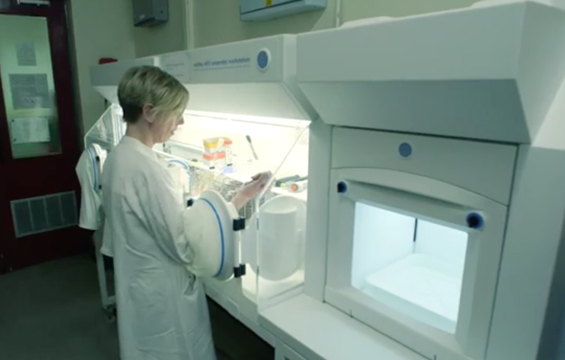
Nearly half a million infections are caused by Clostridium difficile (C. difficile) in the United States annually, with approximately 17% experiencing at least one recurrence; almost 6% of patients die within 30 days of diagnosis. The standard first-line treatment for C. difficile infection CDI relies on the antibiotic metronidazole; however, metronidazole is not as effective for severe cases of CDI, due to its rapid absorption in the upper GI tract. At Texas A&M, Julian Hurdle’s group are using Don Whitley Scientific anaerobic workstations to improve treatment outcome by developing modified derivatives of metronidazole. Microbiology International is the exclusive distributor of Don Whitly Scientific Anaerobic Workstations in North America.
Julian Hurdle and Philip Cherian describe their research in their 2015 paper “Gastrointestinal localization of metronidazole by a lactobacilli-inspired tetramic acid motif improves treatment outcomes in the hamster model of Clostridium difficile infection” . In essence, the group synthesized a series of metronidazole derivatives with a tetramic acid motif utilized by Lactobacillus strains, assaying their efficacy in C. difficile cultures growing in an A35 anaerobic workstation by Don Whitley Scientific. In animal experiments, the modified compounds were found to exhibit significantly better efficacy in treating CDI, due to minimal absorption as compared to the unmodified drug. The A35 anaerobic workstation enables comfortable glove-less access to the chamber, where cultures are manipulated and incubated under consistent anaerobic conditions. Features such as HEPA containment and anaerobic conditions monitoring system guarantee that the atmosphere inside the workstation is absolutely anaerobic and hyper-clean. Drs. Hurdle and Cherian have recently applied for a patent for compounds and methods based on their C. difficile research.
All over the world, labs are using the Don Whitley Scientific workstations to research C. difficile. Leeds General Infirmary in the UK is a good example: with 5 Whitley workstations, they have taken on the C. difficile challenge. Dr. Jane Freeman at Leeds uses an A95 Anaerobic Workstation, our largest workstation which can accommodate 2 technicians simultaneously and has a capacity of up to 1400 plates. The team at Leeds Infirmary appreciate the reliable anaerobic atmosphere, the spacious working area, and the ability to keep instrumentation inside the workstation. Watch this video highlighting Dr. Freeman’s work with C. difficile.

